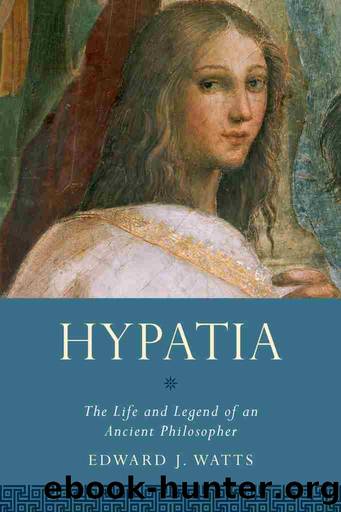Hypatia by Edward J. Watts

Author:Edward J. Watts [Watts, Edward J.]
Language: eng
Format: epub
Tags: History
Publisher: Oxford University Press, Incorporated
Published: 2017-03-15T00:00:00+00:00
9
The Memory of Hypatia
The discordance between the type of person that Hypatia was and the brutal way in which she died explains the initial shock that many people felt at her murder. People across the empire came to see her death as a new and frightening break from the social conventions that had ensured the functioning of the empire for centuries. Hypatia had never been a public official, nor had she been an officeholder. She was a philosopher who engaged in public life in order to make her city and her fellow citizens better. Historically, such figures had been exempt from the sorts of displays of intimidation and violence that sometimes accompanied political gridlock in Roman cities. The metastasis of violence her death represented would have seemed as profoundly dangerous and destabilizing to people in Alexandria and Constantinople as the urban riots in the spring and summer of 1968 seemed to people in the United States. The horror of Hypatiaâs murder blended with the fear of what might come next to make people profoundly anxious.
As time passed, Alexandria quieted. Instead of heralding the explosion of even greater anarchy, Hypatiaâs death finally resolved the conflict between Orestes, Cyril, and the Alexandrian elites. All parties feared further escalation and appear to have stood down. Orestes seems to have finished his term in office and left Egypt; we hear nothing more about him. Cyril, for his part, would remain Alexandriaâs bishop until 444, during which time the city would remain free from major riots. This period of calm did not, however, make people forget Hypatiaâs death. Outside of Alexandria, the murder of a female philosopher and the role that Cyril had played in creating the climate that led to it fit too neatly into a larger narrative about the Alexandrian bishop to be forgotten. This was particularly true because the peace that Cyril had brought to Alexandria did not extend to the wider empire. Cyrilâs rivalry with bishop Nestorius of Constantinople, the empire-wide Christological division that this ultimately provoked, and Cyrilâs use of force and intimidation to emerge victorious ensured that the memory of Hypatiaâs murder stayed alive.
Download
This site does not store any files on its server. We only index and link to content provided by other sites. Please contact the content providers to delete copyright contents if any and email us, we'll remove relevant links or contents immediately.
The Daily Stoic by Holiday Ryan & Hanselman Stephen(3304)
The Fate of Rome: Climate, Disease, and the End of an Empire (The Princeton History of the Ancient World) by Kyle Harper(3055)
People of the Earth: An Introduction to World Prehistory by Dr. Brian Fagan & Nadia Durrani(2733)
Ancient Worlds by Michael Scott(2682)
Babylon's Ark by Lawrence Anthony(2673)
The Daily Stoic by Ryan Holiday & Stephen Hanselman(2572)
Foreign Devils on the Silk Road: The Search for the Lost Treasures of Central Asia by Peter Hopkirk(2463)
India's Ancient Past by R.S. Sharma(2451)
MOSES THE EGYPTIAN by Jan Assmann(2412)
The Complete Dead Sea Scrolls in English (7th Edition) (Penguin Classics) by Geza Vermes(2277)
The Earth Chronicles Handbook by Zecharia Sitchin(2227)
Lost Technologies of Ancient Egypt by Christopher Dunn(2223)
24 Hours in Ancient Rome by Philip Matyszak(2078)
Alexander the Great by Philip Freeman(2064)
Aztec by Gary Jennings(2023)
The Nine Waves of Creation by Carl Johan Calleman(1915)
Curse Tablets and Binding Spells from the Ancient World by Gager John G.;(1860)
Before Atlantis by Frank Joseph(1849)
Earthmare: The Lost Book of Wars by Cergat(1824)
